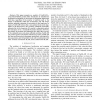Free Online Productivity Tools
i2Speak
i2Symbol
i2OCR
iTex2Img
iWeb2Print
iWeb2Shot
i2Type
iPdf2Split
iPdf2Merge
i2Bopomofo
i2Arabic
i2Style
i2Image
i2PDF
iLatex2Rtf
Sci2ools
ICRA
2006
IEEE
2006
IEEE
Consistency of the FastSLAM Algorithm
— This paper presents an analysis of FastSLAM— a Rao-Blackwellised particle filter formulation of simultaneous localisation and mapping. It shows that the algorithm degenerates with time, regardless of the number of particles used or the density of landmarks within the environment, and will always produce optimistic estimates of uncertainty in the long-term. In essence, FastSLAM behaves like a non-optimal local search algorithm; in the short-term it may produce consistent uncertainty estimates but, in the long-term, it is unable to adequately explore the state-space to be a reasonable Bayesian estimator. However, the number of particles and landmarks does affect the accuracy of the estimated mean and, given sufficient particles, FastSLAM can produce good non-stochastic estimates in practice. FastSLAM also has several practical advantages, particularly with regard to data association, and will probably work well in combination with other versions of stochastic SLAM, such as EKF-ba...
Consistent Uncertainty Estimates | ICRA 2006 | Optimistic Estimates | Particle filter Formulation | Robotics |
Related Content
| Added | 11 Jun 2010 |
| Updated | 11 Jun 2010 |
| Type | Conference |
| Year | 2006 |
| Where | ICRA |
| Authors | Tim Bailey, Juan Nieto, Eduardo Mario Nebot |
Comments (0)

